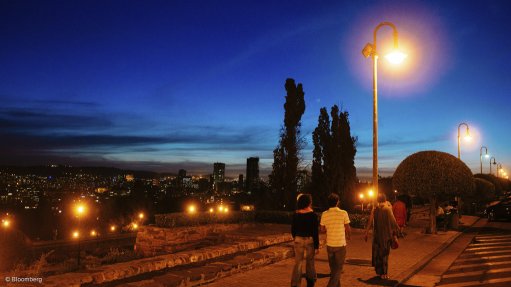
CONNECTION AIM
The African Development Bank’s New Deal on Energy for Africa advocates the ultimate objective of achieving universal access to electricity within ten years
Photo by: Bloomberg
African Development Bank Group (AfDB) president Akinwumi Adesina has invited the New Development Bank (NDB) to support ‘Light up and power Africa’ – the first of five top priorities of the AfDB’s continental transformation agenda.
Speaking at the second annual meeting of the NDB in New Delhi last month, Adesina commended the speedy start and approvals of $1.5-billion for projects, some in Africa. He urged the new bank to do more for the continent, as it needed support to accelerate its growth and development.
The NDB was established in 2014 with $100-billion in share capital from Brazil, Russia, India, China and South Africa.
NDB president Kundapur Vaman Kamath announced at the meeting that it would soon establish an Africa Regional Centre. Adesina further stressed that Africa remained “a good address for business”, noting that, despite the tough global economic environment, African countries continued to post resilient growth.
African economies grew by 2.2% in 2016, with growth projected to rise by 3.4% in 2017, he said, adding that 12 African countries grew by more than 5% in 2016, while 20 other countries posted growth rates ranging between 3% and 5%.
By 2050, the continent is expected to have the same population as that of present-day China and India combined, and a growing urban middle class that would boost consumer demand, Adesina added.
For the AfDB and Africa, the greatest need for strategic partnership lay in energy infrastructure, which should be considered as an emergency on a continent where 645-million people do not have access to electricity.
Consequently, the bank launched the New Deal on Energy for Africa, which espouses the ultimate objective of achieving universal access to electricity within ten years. The bank is working on investing $12-billion in energy in the next five years and leveraging an additional $45-billion to $50-billion from the private sector.
“We plan to connect 130-million people to the grid system – 75-million people through off-grid systems – and provide 150-million people with access to clean cooking energy,” Adesina said.
Further, the AfBD is taking the lead on matters concerning renewable energy and an off-grid revolution in Africa by hosting the Africa Renewable Energy Initiative. This initiative was jointly embarked on with the African Union and has attracted $10-billion in investment commitments from G7 countries.
The bank is also tapping into domestic channels, such as pension funds, to close Africa’s $50-billion yearly infrastructure funding deficit.
Africa’s pension funds are projected to reach $1.3-trillion by 2025, while tax revenues already exceed $500-billion a year, alongside sovereign wealth funds estimated at $164-billion.
The AFDB will also launch the Africa Investment Forum this year to leverage African and global sovereign wealth funds to attract investment by institutional investors and ensure that infrastructure becomes an asset class that can endear itself to the private sector.
Adesina highlighted the Africa50, a new infrastructure entity now capitalised by African countries at more than $865-million, was established to quickly develop and finance bankable projects.
He also called for the scaling up of guarantee facilities to larger co-guarantees pooled across multilateral development banks to help accelerate infrastructure investments in Africa, noting that these instruments had been successfully used to help mitigate risks for the concentrated solar power project in Morocco, the largest in the world.
“We have done the same for the Lake Turkana wind farm, in Kenya, the largest wind farm in Africa, among several others,” he highlighted.